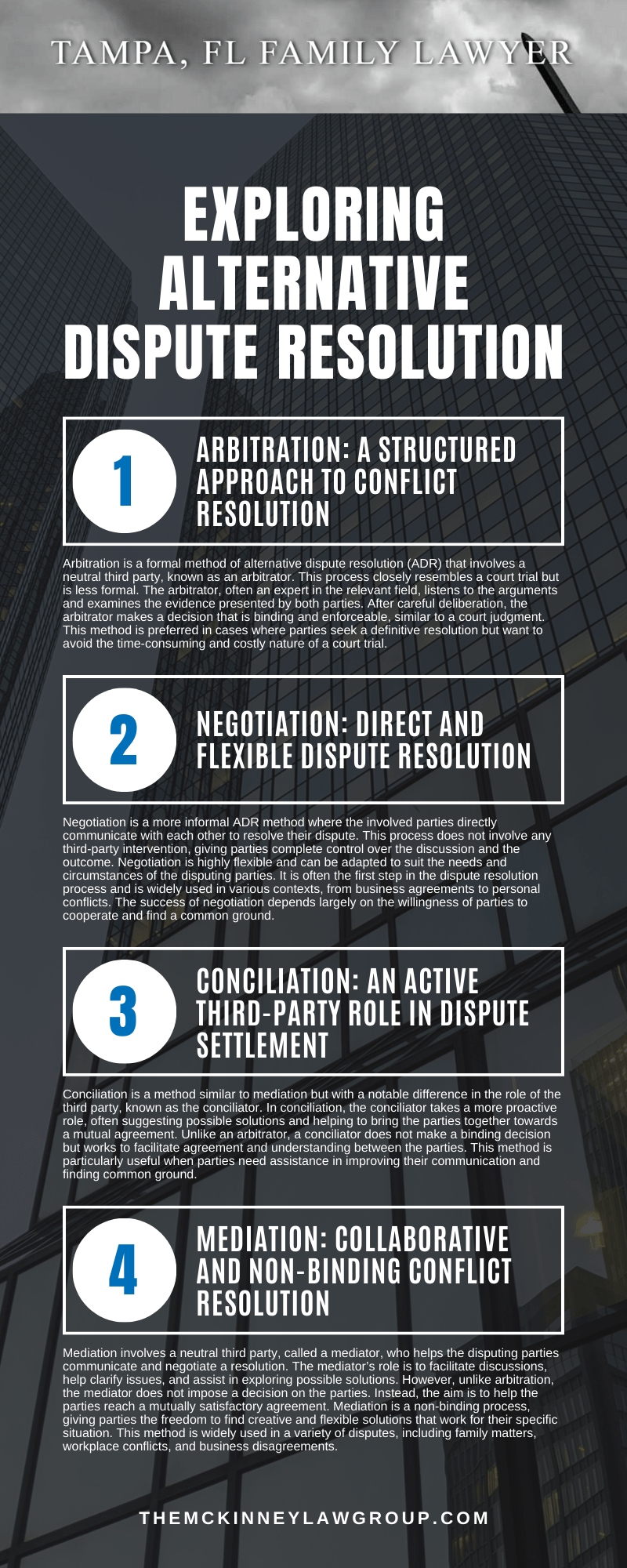
Compassionate & Skilled Representation for Your Family’s Future
Family law issues touch the most personal aspects of your life—your children, your marriage, your home, and your financial future. At The McKinney Law Group, we understand the weight of these matters and approach every case with compassion, integrity, and proven legal skill. Led by Damien McKinney, Esq., a Board-Certified Specialist in Marital and Family Law by The Florida Bar, our firm offers the expertise and dedication needed to help Tampa families navigate even the most difficult disputes. Fewer than 1% of Florida attorneys hold this board certification, making it a mark of trust and distinction. With nearly two decades of experience, Damien McKinney has earned recognition in Super Lawyers for excellence in family law year after year, providing confidence that your case will be handled with the highest level of professionalism.
- Compassionate & Skilled Representation for Your Family’s Future
- Understanding Family Law in Florida
- Divorce Representation in Tampa
- Child Custody and Parenting Plans
- Child Support in Florida
- Alimony and Spousal Support
- Property Division and Equitable Distribution
- Domestic Violence and Protective Injunctions
- Prenuptial and Postnuptial Agreements
- Modifications and Enforcement of Orders
- Military Family Law Matters
- High-Asset and Complex Family Law Cases
- Mediation and Alternative Dispute Resolution
- Why Clients Trust The McKinney Law Group
- Tampa Family Law Infographic
- Tampa Family Law Statistics
- Family Law FAQs
- Family Law Services in Tampa, FL
- Tampa Family Law Glossary
- The McKinney Law Group – Tampa Family Law Firm
Understanding Family Law in Florida
Florida’s family law system governs a wide range of personal legal matters including marriage dissolution, parenting plans, alimony, and property division. These issues require not only a thorough understanding of state statutes but also an appreciation for the emotional weight involved in these decisions.
As your Tampa family lawyer, we provide clear, honest guidance through:
- Domestic violence injunctions
- Divorce (contested and uncontested)
- Child custody and time-sharing agreements
- Child support and enforcement
- Alimony and spousal support
- Property division and equitable distribution
- Prenuptial and postnuptial agreements
- Modifications and enforcement actions
Divorce Representation in Tampa
Florida is a no-fault divorce state, which means that either spouse can file for divorce simply by stating that the marriage is irretrievably broken. While the law may sound straightforward, the reality of divorce can be complex. The process begins with filing a petition, serving the other spouse, and resolving issues such as division of assets, alimony, child custody, and child support. We assist clients in both uncontested divorces, where the parties agree on all terms, and contested divorces, where disputes must be resolved through negotiation, mediation, or trial. In uncontested divorces, our role is to draft agreements that reflect your intentions while protecting you from future disputes. In contested cases, we provide aggressive representation in court, supported by strong evidence, financial analysis, and expert testimony when necessary.
Child Custody and Parenting Plans
One of the most sensitive aspects of family law involves children. In Florida, the terms “custody” and “visitation” have been replaced with parental responsibility and time-sharing, reflecting the belief that both parents should remain actively involved in their child’s life whenever possible. Parenting plans must address schooling, healthcare, religious upbringing, and daily schedules. Courts decide these matters based on the best interests of the child, which involves evaluating factors such as the child’s relationship with each parent, stability of the home, history of domestic violence, and the ability of each parent to meet the child’s needs. We help parents design parenting plans that provide stability while allowing flexibility as children grow. When disputes arise, we advocate strongly to protect parental rights and safeguard the well-being of the child.
Child Support in Florida
Florida uses statutory guidelines to calculate child support, primarily based on each parent’s income, the number of overnights with the child, healthcare costs, and daycare expenses. However, courts may deviate from these guidelines when special circumstances exist, such as a child with medical needs or a significant disparity in parental resources. We assist clients in both establishing child support and modifying orders when circumstances change. If a parent fails to pay, we also handle enforcement actions to secure compliance.
Alimony and Spousal Support
Spousal support, or alimony, is another key issue in many divorces. Florida recognizes several types of alimony:
- Bridge-the-gap alimony, providing short-term assistance as one spouse transitions to post-divorce life
- Rehabilitative alimony, intended to help a spouse gain education or training to become self-sufficient
- Durational alimony, providing support for a set period based on the length of the marriage
- Permanent alimony, available only in limited circumstances, usually after long-term marriages
Courts determine alimony by considering factors such as length of the marriage, standard of living, age and health of the spouses, financial resources, and each party’s earning capacity. We work to ensure that any alimony order is fair and based on accurate financial information, whether we are representing the paying spouse or the recipient.
Property Division and Equitable Distribution
Florida follows the principle of equitable distribution, which requires that marital assets and debts be divided fairly, though not necessarily equally. Marital property typically includes homes, vehicles, retirement accounts, business interests, and investments acquired during the marriage. Non-marital property—such as assets owned prior to marriage or received as gifts or inheritances—usually remains separate. These distinctions can be complicated, particularly if assets were commingled during the marriage. Our firm uses detailed financial analysis to identify and value marital property, uncover hidden assets, and ensure that your financial rights are protected.
Domestic Violence and Protective Injunctions
Family law cases often involve situations where safety is a concern. Victims of domestic violence may seek protective injunctions, also known as restraining orders, which can provide immediate relief and protection. These orders may affect time-sharing arrangements, financial support, and even residency in the family home. We represent both victims seeking protection and individuals defending against allegations, ensuring that due process is respected and safety is prioritized.
Prenuptial and Postnuptial Agreements
Many couples choose to create agreements before or during marriage to define how assets will be handled in the event of divorce. Prenuptial agreements are signed before marriage, while postnuptial agreements are created after the marriage has begun. These agreements can address property division, alimony, business ownership, and inheritance rights. When drafted properly, they provide clarity and reduce conflict. We help clients draft, review, and enforce these agreements, ensuring they meet Florida’s legal standards for validity.
Modifications and Enforcement of Orders
Life is unpredictable, and circumstances often change after a divorce or family law judgment. Florida law allows for modification of parenting plans, child support, and alimony when a substantial change occurs. Examples include job loss, relocation, remarriage, or changes in a child’s needs. We assist clients in filing modification petitions and presenting evidence to support or contest requested changes. We also handle enforcement of court orders, including wage garnishments, contempt actions, and other remedies to ensure compliance.
Military Family Law Matters
Tampa’s proximity to MacDill Air Force Base means that many of our clients are active duty service members or military spouses. Military divorces present unique challenges, including compliance with federal laws such as the Uniformed Services Former Spouses’ Protection Act (USFSPA) and issues involving deployment, military pensions, and TRICARE benefits. Our experience with military family law allows us to protect service members’ rights while addressing the special needs of military families.
High-Asset and Complex Family Law Cases
Some divorces involve substantial wealth, business ownership, or high-value assets that require sophisticated legal and financial strategies. These cases may include stock options, professional practices, multiple properties, or international holdings. We collaborate with financial experts, forensic accountants, and appraisers to ensure accurate valuation and equitable division. Our board-certified expertise is particularly valuable in these high-stakes cases, where mistakes can have lasting consequences.
Mediation and Alternative Dispute Resolution
Florida courts strongly encourage mediation in family law cases. Mediation allows spouses to work with a neutral third party to reach agreements on parenting, property, and financial matters. It is often less expensive and less adversarial than trial, and it allows families to retain more control over the outcome. We prepare clients thoroughly for mediation, ensuring they understand their rights, their priorities, and the possible outcomes before entering negotiations. When mediation succeeds, families save time, money, and emotional strain. If mediation fails, we are fully prepared to litigate in court.
Why Clients Trust The McKinney Law Group
Client-centered representation, with clear communication and personalized strategies designed to achieve your goals
Board-Certified in Marital and Family Law – a distinction earned by fewer than 1% of Florida attorneys
Nearly 20 years of legal experience focused exclusively on family law matters
Recognized by Super Lawyers for multiple consecutive years
Active member of the Florida Bar Family Law Section, contributing to legal policy and professional development
Proven results in contested custody cases, high-asset property divisions, and complex modifications
Tampa Family Law Infographic

Tampa Family Law Statistics
According to the U.S. Census Bureau, the United States has about 12.9 million custodial parents. Over one-quarter of all children younger than 21 years of age (26.5%) had one of their parents living outside of their household in 2018. That’s approximately 21.9 million children. The majority of custody cases – about 90 percent – are settled without a judge’s ruling. If you are involved in a custody dispute, make sure you have our skilled family attorney advocating for you.
Family Law FAQs
How long does a divorce take in Tampa? Uncontested divorces may finalize in as little as 30–60 days, while contested divorces often take six months to over a year depending on the complexity.
Do I have to go to court? Not always. Many family law matters are resolved through mediation or settlement agreements. Court becomes necessary only if the parties cannot agree.
What counts as a substantial change in circumstances for modifying custody or support? Substantial changes may include job loss, relocation, remarriage, health concerns, or a child’s evolving needs.
Can a parenting plan be changed later? Yes. Parenting plans can be modified if it is in the child’s best interests and a substantial change in circumstances is demonstrated.
What if my spouse hides assets during divorce? We use discovery tools, subpoenas, and forensic accountants to identify hidden or undisclosed assets, ensuring a fair outcome.
Family Law Services in Tampa, FL
At The McKinney Law Group, we provide comprehensive family law services tailored to the needs of individuals and families in Tampa. Our team understands that family-related legal matters often carry both emotional and financial weight, and we are committed to offering skilled guidance with a focus on protecting your rights and achieving fair outcomes. From complex divorce cases to child custody disputes and beyond, we offer the full range of family law representation to help clients move forward with confidence. Here is the list of Family Law Services we provide:
- Alimony
- Annulment
- Appeal
- Appellate
- Child Custody
- Child Protective Services Defense
- Child Support Court Order
- Child Support
- Child Visitation
- Collaborative Divorce
- Collaborative Family Law
- Contested Divorce
- Coronavirus No-Fault Divorce
- Coronavirus Uncontested Divorce
- Custody and Time Sharing
- DCF False Allegations
- Dissolution of Marriage
- Divorce Asset Division
- Divorce Attorney for Men
- Executive Divorce
- Family Dispute Mediation
- Fathers’ Right
- Guardianship
- Joint Child Custody
- Legal Separation
- Matrimonial Law
- Military Divorce
- Parental Rights
- Partnership Dispute
- Post Judgment Modification and Enforcement
- Post-Divorce
- Pre and Post Nuptial Agreement
- Spousal Support
- Uncontested Divorce
- Visitation Rights
Personalized Support For Your Family Law Needs
Having answers to common questions is the proper start when it comes to family law. However, each situation is unique, so a tailored approach can make all the difference. If you have further questions or need assistance with your case, we’re here to help. Call us today for a complimentary consultation to speak with our Tampa family lawyer who can discuss your specific needs and provide guidance. Attorneys like those at The McKinney Law Group, serving both North Carolina and Florida, understand the importance of each decision in family law matters and are here to support you through every step.

Tampa Family Law Glossary
- Parental Responsibility: The authority to make important decisions about a child’s upbringing.
- Time-Sharing: The schedule determining when each parent spends time with the child.
- Equitable Distribution: The fair, but not necessarily equal, division of marital property and debts.
- Prenuptial Agreement: A contract made before marriage outlining property and financial arrangements.
- Postnuptial Agreement: A similar contract made during the marriage.
- Alimony: Financial support paid by one spouse to another after separation or divorce.
- Mediation: A structured process where a neutral third party helps spouses resolve disputes outside of court.
The McKinney Law Group – Tampa Family Law Firm
1105 W Swann Ave #100
Tampa, FL 33606
Schedule a Confidential Consultation with our Tampa Family Lawyer Today
Every family’s story is different, and so is every family law case. Whether you are facing divorce, seeking custody of your child, requesting alimony, or trying to enforce an existing order, The McKinney Law Group is here to provide clear answers and trusted legal representation. Our Tampa office serves clients with professionalism, compassion, and a relentless commitment to achieving favorable results. Call us today at (813) 906-0048 to schedule your confidential consultation with Damien McKinney, Esq., and take the first step toward securing your family’s future
Client Review
“The McKinney Law Group is a quality and professional family law firm in Tampa.”
Evan Guthrie

